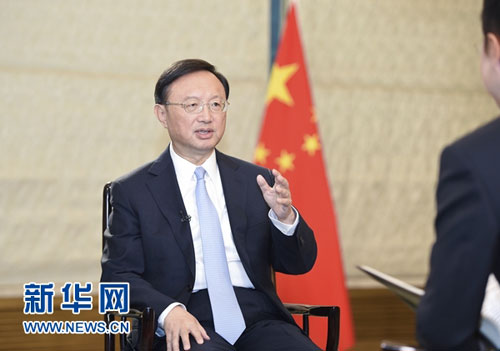
On July 14, 2016, State Councilor Yang Jiechi gave an interview to state media on the so-called award of the Arbitral Tribunal for the South China Sea arbitration during which he elaborated on China's position.
Yang Jiechi noted that the Arbitral Tribunal for the South China Sea arbitration has issued its so-called award. This award is illegal and invalid in every sense. The Chinese government has released relevant statements and a White Paper stating its solemn position of firmly opposing the arbitration and not accepting or recognizing the award. This position of the central government has the strong support and endorsement from people of various social sectors in China. They have expressed their unequivocal attitude of opposing the illegal arbitration and safeguarding sovereign rights and interests by contributing articles and articulating views through the press, TV and SMS as well as online platforms like WeChat and Weibo.
Yang Jiechi pointed out that the South China Sea arbitration has been a political farce all along, staged under the cover of law and driven by a hidden agenda. Certain countries outside the region have attempted to deny China's sovereign rights and interests in the South China Sea through the arbitration. They have even brought other countries into the scheme to isolate and discredit China in the international community with a view to holding back China's peaceful development. But such attempts are futile, to say the least, and in so doing, they are only lifting a stone to drop it on their own feet. I must point out that the arbitration runs counter to the spirit of international rule of law, puts regional peace and stability in jeopardy, and undermines the interests of the international community. Most countries in the world see this clearly. Over 70 countries and international and regional organizations have made statements showing their understanding of and support for China's position. This speaks volumes about the attitude of the international community toward the political farce, proving the futility of certain countries' scheme to hem in and smear China.
Yang Jiechi stressed that sovereignty is a bottom line for China. Big as China is, we cannot afford to give away a single inch of territory that our ancestors have left to us. China's territorial sovereignty and maritime rights and interests in the South China Sea have been formed over the course of over two thousand years. They are fully backed by historical and legal evidence. Under no circumstances can they ever be negated by a so-called award that is full of nonsense. The award can neither change historical facts nor deny China's claims of rights and interests in the South China Sea. Still less can it waver our resolve and determination to safeguard territorial sovereignty and maritime rights and interests. China's position of not accepting or recognizing the award will not change. At the same time, China will stay committed to following a path of peaceful development, to resolving the disputes in the South China Sea through negotiation and consultation, to developing friendly relations and win-win cooperation with its neighbors, and to working with others to maintain peace and stability in the South China Sea.
Yang Jiechi said that a basic requirement of international rule of law is that actions must be taken in strict accordance with the law. The crux of disputes between China and the Philippines in the South China Sea are issues concerning territory and maritime delimitation. In disregard of China's staunch position, the Arbitral Tribunal willfully went beyond its authority, turned a blind eye to the history and reality of the South China Sea and misinterpreted relevant stipulations of UNCLOS. It has deviated from UNCLOS from the very beginning and overstepped and expanded its authority to render this award. Naturally, such an award can only be illegal and invalid. The Tribunal can in no way represent international law, still less equity and justice in the world.
Yang Jiechi emphasized that history brooks no distortion and law no abuse. China's sovereignty, rights and relevant claims in the South China Sea are gradually formed and developed by the practice of the Chinese people throughout millennia and have been upheld by successive Chinese governments. As early as in 1948, the Chinese government marked the dotted line in the South China Sea on its officially published map, which affirmed China's sovereignty over the South China Sea Islands and maritime rights and interests in their adjacent waters. China's claims of rights and interests in the South China Sea long predate the signing of UNCLOS. They shall by no means be denied by UNCLOS, still less by an unwarranted and flawed award. China's sovereignty and maritime rights and interests in the South China Sea are protected by both international law and UNCLOS.
Yang Jiechi expressed that the South China Sea, important to the Chinese people since ancient times, is our heritage to which our forefathers devoted their wisdom and even lives. The Chinese government remains unwavering in its resolve to safeguard China's territorial sovereignty and maritime rights and interests in the South China Sea. The Chinese people do not covet other countries' interests or envy their development. At the same time, we will never give up our legitimate interests. No country should expect us to trade our core interests away or swallow the bitter consequences of our sovereignty, security and development interests being undermined. The Chinese government and people will remain united and act resolutely to safeguard every inch of our land and every swath of our waters.
Yang Jiechi pointed out that nature of this arbitration is a farce in which certain countries use international law as a cover to pursue their own hidden agenda, and a case in point of how non-regional countries interfere in the South China Sea issue. China's position on the arbitration fully complies with international law. China has all along been an active player in building up and enhancing the regional and international order. The arbitration will not in the slightest way shake China's resolve to pursue the path of peaceful development. China remains committed to developing friendly relations with other countries on the basis of the Five Principles of Peaceful Co-existence, and deepening win-win cooperation and connectivity with its neighbors. It adheres to negotiation and consultation as a means for addressing relevant territorial and maritime delimitation issues, and resolutely safeguards peace and stability in the region. China means what it says and follows a consistent policy.
Yang Jiechi noted that China is ready to, on the basis of respecting historical facts and in compliance with international law, UNCLOS included, discuss with countries directly concerned about temporary arrangements pending final settlement of the dispute, which include joint development in relevant waters in the South China Sea for mutual benefits and win-win outcomes, so that together we can maintain peace and stability in the South China Sea. We call on the new Philippine government to bear in mind the common interests of our two countries and the broader picture of bilateral ties and properly handle relevant issues. As long as China and the Philippines remain committed to the principles and spirit of the Declaration on the Conduct of the Parties in the South China Sea (DOC), to properly settling differences through dialogue and consultation and growing friendship and mutually beneficial cooperation,our bilateral ties will enjoy a bright future.
